Contents
| |
| Decades: |
| See also: History of Macau |
| |||||
| Decades: | |||||
|---|---|---|---|---|---|
| See also: | Other events of 1999 History of Macau | ||||
Events from the year 1999 in Macau.
| |
| Decades: |
| See also: History of Macau |
| |||||
| Decades: | |||||
|---|---|---|---|---|---|
| See also: | Other events of 1999 History of Macau | ||||
Events from the year 1999 in Macau.
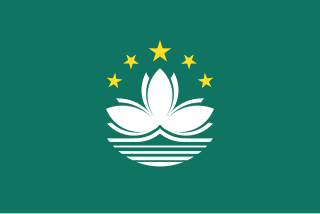
Macau or Macao is a special administrative region of the People's Republic of China. With a population of about 710,000 people and a land area of 32.9 km2 (12.7 sq mi), it is the most densely populated region in the world.
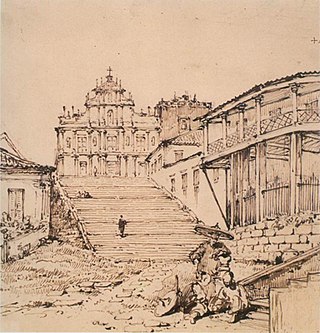
Macau is a special administrative region (SAR) of the People's Republic of China. It was leased to Portugal in 1557 as a trading post in exchange for a symbolic annual rent of 500 tael. Despite remaining under Chinese sovereignty and authority, the Portuguese came to consider and administer Macau as a de facto colony. Following the signing of the Treaty of Nanking between China and Britain in 1842, and the signing of treaties between China and foreign powers during the 1860s, establishing the benefit of "the most favoured nation" for them, the Portuguese attempted to conclude a similar treaty in 1862, but the Chinese refused, owing to a misunderstanding over the sovereignty of Macau. In 1887 the Portuguese finally managed to secure an agreement from China that Macau was Portuguese territory. In 1999 it was handed over to China. Macau was the last extant European territory in continental Asia.

Transport in Macau includes road, sea, rail and air transport. Road transport is the primary mode of transport within Macau, although a new rail system opened in December 2019 serving the areas of Taipa and Cotai. The main forms of public transport are buses and taxis.
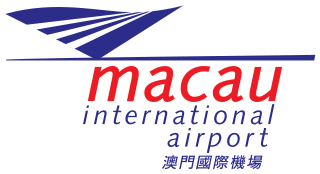
Macau International Airport is an international airport in the special administrative region of Macau, situated at the eastern end of Taipa island and neighbouring waters. It opened for commercial operations on 9 November 1995, during Portuguese administration of the region.

Taipa is an area in Macau, connected to Coloane through the area known as Cotai, which is largely built from reclaimed land. Located on the northern half of the island, Taipa's population is mostly suburban. Administratively, the boundaries of the traditional civil parish Freguesia de Nossa Senhora do Carmo are mostly coterminous with that of the former Taipa Island, except for a portion of the parish that lies on the island of Hengqin (Montanha), housing the campus of the University of Macau.

The Regional Flag of the Macau Special Administrative Region of the People's Republic of China is light green with a lotus flower above the stylised Governador Nobre de Carvalho Bridge and water in white, beneath a circular arc of five golden five-pointed stars: one large star in the center of the arc with two smaller stars on each side of the large star, each with a point angled directly outward from the center of the common circle on which they lie.

The Macanese pataca or Macau pataca is the currency of Macau. It is subdivided into 100 avos, with 10 avos called ho (毫) in Cantonese.

The Monetary Authority of Macao is the currency board and the de facto central bank of Macau. The regulatory institution was established on December 20, 1999, upon the transfer of sovereignty over Macau from Portugal to the People's Republic of China as the Macau Special Administrative Region.

Hengqin is an island that lies mostly in Zhuhai, a prefecture-level city and special economic zone in Guangdong Province of the People's Republic of China. It has a population of about 3,000. Parts of Hengqin are leased to Macau by the State Council of the People's Republic of China, starting from 2009, mostly to house the new campus of the University of Macau. In the leased parts of the island, Macau law applies.

The Macau Light Rapid Transit is a mass transit system in Macau and is also the first railway system in Macau. The first phase of the project started construction in February 2012, and the first section of the Taipa line was opened to the public on 10 December 2019, followed by the Barra Station Extend Line on 8 December 2023. MTR (Macau), a wholly-owned subsidiary of MTR, was operating and maintaining the MLRT under the operations and maintenance assistance services, until it expires in December 2024. Macao Light Rapid Transit Corporation, Limited (MLM) is directly responsible for the operations and maintenance assistance services of the MLRT from 1 April 2024.

The handover of Macau from the Portuguese Republic to the People's Republic of China was at midnight on 20 December 1999. This event ended 442 years of Portuguese rule in the former settlement, which began in 1557.

Macau Post and Telecommunications, most commonly known as CTT, is an entity under the Government of Macao responsible for postal services and telecommunications regulation.
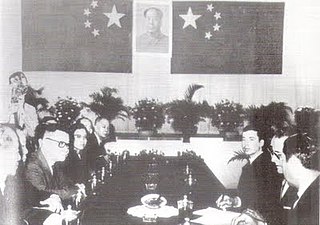
The 12-3 incident was a series of political demonstrations and riots against Portuguese colonial rule in Macau which occurred on December 3, 1966. The incident, inspired by the Cultural Revolution in the People's Republic of China, occurred as a direct response to a violent police crackdown by colonial authorities against local Chinese protesters demonstrating against corruption and colonialism in Macau.

The following outline is provided as an overview of and topical guide to Macau:
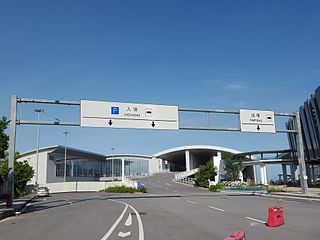
The Taipa Ferry Terminal is located in Taipa, Macau SAR. It is located in the reclamation area of Pac On and is adjacent to the Macau International Airport. The terminal provides high-speed passenger ferry services from Macau to Hong Kong, Zhuhai, Shenzhen and Dongguan.

The Taipa Houses–Museum is housed in a set of old houses in Taipa, Macau, China.
The Baháʼí Faith in Macao was established much later than in China due, most likely, to the unique conditions of Macau being a Portuguese colony until 1999 and it being somewhat in the shadow of Hong Kong and larger centers in mainland China like Shanghai. The Baháʼí Faith arrived in Shanghai in 1862 and Hong Kong in 1870 but not in Macau until 1953.

Ho YinComB was a businessman, politician and senior leader of the Chinese community in Macau.

The Taipa line is the first and currently the only servicing line in Macau Light Rapid Transit. The line initially opened on 10 December 2019, providing service between Ocean and Taipa Ferry Terminal as the first phase of the Taipa Line. The automated guideway transit line has a U-shaped route within the island of Taipa and currently connects 13 stations; a link to Macau Peninsula officially opened on 8 December, 2023.
José Manuel de Sousa e Faro Nobre de Carvalho was a Portuguese army brigadier-general and colonial administrator. He served as the 121st Governor of Macau from 1966 to 1974.